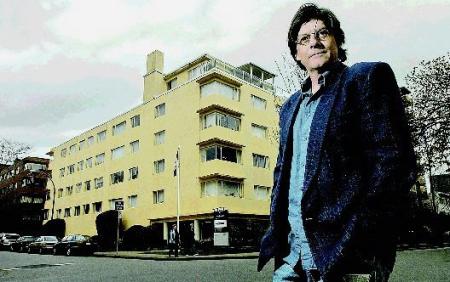The public wants to hear more about affordability, top planners tell council
Frances Bula
Sun

TENANTS FIGHT EVICTIONS IN A TIGHT RENTAL MARKET: Craig Adlard is one of the 19 people being evicted from the West End’s Glenmore Apartment (background). The tenants accuse the landlord of serving mass evictions so the company can raise rents for new tenants. Story, B5 Photograph by : Ward Perrin, Vancouver Sun
Vancouver residents need to hear more about how EcoDensity is going to provide affordable housing, the city’s top planners told city council Tuesday.
That means a new draft of the city’s EcoDensity Charter — which will set directions and guidelines for making the city denser with more environmental design — will have to show that not all the new housing is going to be more condos for the rich.
And it will set the city in a direction towards ways to “manage the market” in order to create lower-cost housing, said chief planner Brent Toderian and housing-centre director Cameron Gray.
They were speaking to council about where the city’s ambitious new policy goes from here, after seven nights of public hearings that attracted a record 150 speakers.
Gray acknowledged that many who came to council to present their views on the last draft expressed worry about the kind of housing that has been and will be built in the city.
“The concern is that the city is in danger of losing its social diversity and becoming a city of house-rich if cash-poor empty nesters, double-income-no-kids couples, yuppies, second-home owners, etc., with everyone else scrambling to make ends meet, paying too much, living too far away, or living in housing that is inadequate and insecure,” said Gray.
“The [revised] EcoDensity needs to address whether the market needs more direction regarding the kind of housing being developed.”
Gray said that means every aspect of the charter will be looked at and potentially rewritten to clarify what the impact on housing affordability will be. As well, the charter could ask staff to explore ways to regulate the market to create types of low-cost housing that are in short supply now.
The city could, for example, require that all new projects require a certain number of three-bedroom units, or that a certain percentage be designated as rental units instead of being sold.
The city could also look at whether to move to inclusionary zoning.
That’s a policy that requires developers to build into major projects units that rent at affordable rates.
It’s an idea that was pioneered in some American cities in the 1970s and has since spread to many others, including Richmond.
Toderian said planning staff will be making some serious revisions to the charter to answer the public’s questions about that issue, along with others about how the city will include parks, community centres and other public services in increasingly dense settings.
Council debated whether to hold another set of public hearings or ask for public views by e-mail on the next draft, with responses posted on the city’s website.
Opposition parties and EcoDensity opponents argued there should be live public hearings, which allow for dialogue and exchange of information.
But councillors from the ruling Non-Partisan Association said it would be just as good and less wasteful of people’s time to get public input through written submissions.
The new, third draft of the EcoDensity charter will be made public May 13 and people will have four weeks to send in their written comments on the revised document.
© The Vancouver Sun 2008

